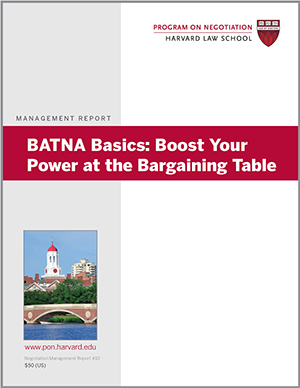
Knowing when to walk away in a negotiation is some of the most powerful information a negotiator can bring to the bargaining table – and this means a negotiator should know her BATNA or best alternative to a negotiated agreement. Back in 2011, as the lead negotiator in 18 months of top-secret talks with Iran over its nuclear program, U.S. State Department Under Secretary for Political Affairs Wendy Sherman found herself negotiating as if through a dark screen. Rather than dealing directly with Iran’s supreme leader, Ali Khamenei, the United States delegation led by Sherman was assigned to interact with Iran’s American-educated foreign minister, Mohammad Javad Zarif, the New York Times reports.
During the course of the discussions, it remained unclear exactly how much negotiating authority Zarif possessed, if any. “We are only going to find out by testing him,” Sherman said. She found the drawn-out process of “signal-sending” with Iran frustrating, the Times reports.
Most of us have had the experience of doubting a counterpart’s ability to make decisions on behalf of his organization. Fortunately, business negotiators typically have more options than Sherman did to improve the situation. Here are three negotiation skills tips you can use in your next bargaining session:
1. Clarify your negotiating counterpart’s authority.
Before you negotiate, ask your counterpart (and her superiors if necessary) to clarify the extent to which she is empowered as an agent in negotiation to make proposals and commitments on behalf of her organization. Though negotiators often must clear significant decisions with their higher-ups, your counterpart should at least know the subject matter of the negotiations well enough to be able to make provisional commitments. Be willing to reveal your own negotiating mandate in return (see also, power in negotiations).
2. Consider adding negotiators.
Before or during the bargaining process, it may become apparent that your counterpart was appointed not because of his qualifications but because of his lack of them—that is, out of a deliberate intention to obfuscate or mislead. If you believe this to be the case, ask to bring in someone who has more relevant expertise and greater decision-making authority.
3. Know when to walk away – Know your BATNA.
Suppose your efforts to bring a more knowledgeable negotiator to the table fail. At this point, it may be time to consider your best alternative to a negotiated agreement, or BATNA—specifically, you might want to consider dealing with a different organization. What if you are unable to cultivate good outside alternatives to further your objectives? Try to build relationships with others in your counterpart’s organization with the goal of working around the obstacle and building a coalition that will support your proposals.
When was the last time that you had to use your BATNA? Share your experience in the comments.
Reprinted from the March 2014 issue of the Negotiation Briefings newsletter.
Originally published in 2014.






Hey Kati Shonk,
I am M. Ed. Student at TRU, kamloops. I choose your article from a given list for presentation ‘Know your BATNA: The power of information in Negotiation(2018).’ But i am unable to get. Can you please guide me how can i get access to it and where?
https://www.pon.harvard.edu/daily/batna/frustrated-by-an-uninformed-negotiator-consider-your-batna/
Hello, I have attached a link to that article.